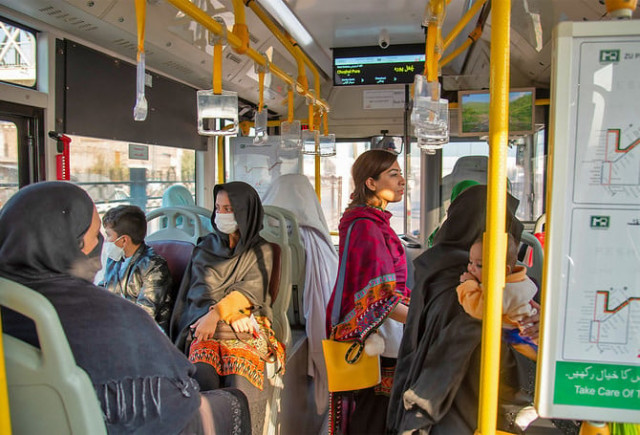Women’s harassment in public transport continues unabated
Lack of reporting mechanisms means that men get away with constantly ogling, snide remarks, groping

Public transport exists to make travel cheaper for the masses but for some passengers, it starts seeming like a curse when the moment they board a bus or train, a feeling of being unsafe creeps in.
The harassment that women in the country suffer out on the streets does not end when they use public transport and due to a lack of reporting mechanisms, many often have to suffer in silence. Whereas, some choose to rely on pricey methods of transport to avoid constantly feeling like they will be stared at, catcalled, or groped.
Ambreen Fatima, a student of the GC University Lahore, while talking to The Express Tribune about women using public transport, said that harassment has become a routine in our daily lives.
“I cannot even recall when I was harassed for the first time. Men will either stare at you from head to toe or pass some untoward remark,” Ambreen lamented.
Similarly, Sidra Ahmed, a resident of Lahore, was of the view that using the metro bus or metro train meant that one has to put up with scanners. “The men will ogle at you and some even try to grope. However, there is little one can do to put an end to such behaviour.”
Faryal Ahmed, a 19-year-old who goes to college in Lahore, talking about her experience of using public transport, said that she wears an abaya but is still ogled at.
Faryal further said that if men are questioned over the staring, they simply start smiling instead of being apologetic. A regular user of the bus rapid transit (BRT) service in Peshawar, 23-year-old Sakeena Jabar also feels that staring is a huge issue.
“Even if your face is covered, the men do not stop staring.” It is this ogling and other incidents of harassment which pushed Fatima Khan, a student at the University of Peshawar, to stop using the BRT.
Fatima informed that she along with her friends would have to hear obscene comments and men would try to grope them during rush hours. However, despite the myriad of problems that women encounter daily, there are no dedicated reporting mechanisms available in all of the country’s government-operated public transport services.
Maheen, a resident of Karachi, who uses the recently launched People’s Bus Service, said, “there is not even a helpline number on this supposedly modern bus service.” She was of the view that since there were no reporting mechanisms, one had to suffer harassment in silence.
Maham Arbab, a student at the Islamia College, agrees. “There is no special desk or helpline to report harassment. The existing complaint mechanism involves talking to male officers which do not take us seriously,” Maham regretted, adding that the government should seriously consider providing a women-only bus service so that women can travel without fear.
Similarly, Razia Bano, a resident of Nazimabad, talking about her experience said that if a person harasses a woman or a girl, some passengers will take action if they see it but there is no other method to report. Razia opined that for cases pertaining to harassment, the bus operating authorities should provide immediate assistance.
“A hotline should be established which women can use to report incidents of harassment. More female police officers should also be appointed as they can deal with such cases in a better way,” suggested Sheena Kirmani, a women’s rights activist from Karachi.
The General Manager Operations of the Punjab Mass Transit Authority, Uzair Shah, said that there was no denying that women faced harassment daily whilst using public transport.
When asked about the measures being adopted in Punjab to make public transport safer for women, Uzair replied: “We are planning on making call centres for reporting complaints. For now, complaints can be registered on our social media pages.”
BRT’s Spokesperson, Sadaf Kamil, when asked about similar measures being taken in Peshawar, said that so far no cases of harassment had been reported. “However, we do have a mechanism in place. Such cases should be immediately referred to the provincial ombudsperson when reported by passengers,” Sadaf explained.
When pointed out that such a mechanism would delay reporting or actually deter women from complaining, Sadaf said that TransPeshawar did not have any authority for law enforcement. Altaf Sario, Managing Director of Sindh Mass Transit Authority (SMTA), which operates the People’s Bus Service, said that so far no incidents of harassment had been reported on the service.
When asked if there was a mechanism in place to report harassment, Sario informed that there were cameras installed in all the buses. “However, the cameras will become operational at the end of November. Apart from that we have separate gates for women and men. Lady officers also check the buses from time to time,” Sario told The Express Tribune.
Additional reporting by Umer Farooq, Razzak Abro, Syed Ashraf Ali


















COMMENTS
Comments are moderated and generally will be posted if they are on-topic and not abusive.
For more information, please see our Comments FAQ